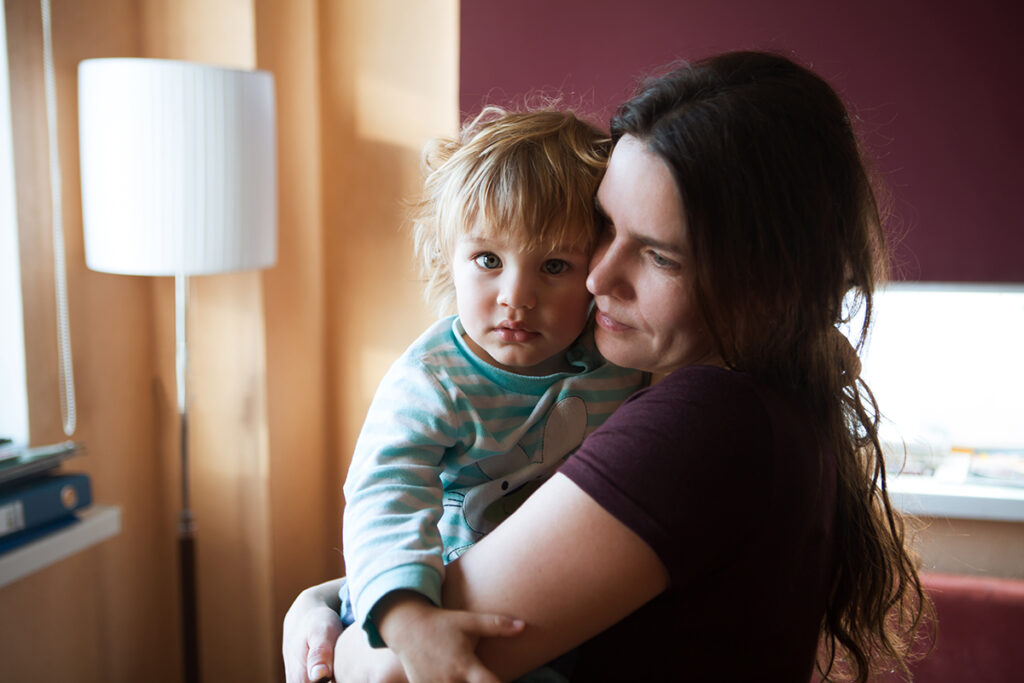Alcohol addiction affects more than just the person who drinks—it deeply impacts family, too. Watching a loved one struggle can bring pain, confusion, and a sense of helplessness. But there is a way forward. At Woodland Recovery Center, our alcohol addiction treatment helps clients rebuild their lives and reconnect with those who matter most. We support healing for the whole family, not just the individual experiencing addiction, through compassionate addiction treatment programs.
How does alcohol addiction affect the whole family?
Families often face emotional pain, financial stress, and broken trust. Over time, alcoholism can lead to serious issues in relationships, especially if the drinking continues without support. Understanding how alcoholism affects families is the first step toward healing.
What are the 5 major effects of alcoholism on families?
1. Damaged relationships
Alcohol addiction can deeply disrupt emotional bonds between spouses, siblings, and children. Over time, it becomes harder to trust, connect, or even communicate honestly. Even small day-to-day moments—like sharing meals or discussing feelings—can become tense or nonexistent. These breakdowns can lead to feelings of isolation and hopelessness within the family.
2. Lasting impact on children
Children in alcoholic households may face emotional trauma, behavioral struggles, and academic difficulties. According to the National Institutes of Health (NIH), almost 19 million children in the U.S. live with a parent who has a substance use disorder.1 These kids may develop anxiety, depression, or even substance use issues later in life. Family addiction support in Mississippi can make a big difference in their future.
Beyond school and emotional concerns, many children take on adult responsibilities at a young age. They may feel pressure to care for siblings or manage household duties, which can rob them of a normal childhood. Some may act out in frustration, while others withdraw emotionally. These early experiences often shape how they relate to others well into adulthood.
3. Codependency and enabling behaviors
These roles often develop as a way to cope with the chaos that addiction brings. Children may become overly responsible or withdrawn, while partners may sacrifice their needs to avoid conflict. Unfortunately, these coping methods add more stress and confusion to the household. Recognizing these roles is the first step to creating healthier boundaries and a more stable environment.
4. Financial and emotional stress
Alcohol addiction can strain both finances and emotions. Regular alcohol purchases, missed work, or medical bills can add up fast. At the same time, family members may feel guilt, fear, or burnout. These pressures can overwhelm even the strongest support systems without outside help.
5. Increased risk of abuse
Alcohol lowers self-control and increases impulsivity, which can raise the risk of emotional or physical abuse. Family members may experience yelling, manipulation, or even violence. The emotional toll of this behavior often leads to long-term trauma. Safe, professional treatment is essential for individuals and their loved ones.
How can family therapy help with recovery?
Family therapy gives everyone a chance to heal. Through counseling, families can rebuild trust, learn how to communicate better, and break harmful patterns. Family therapy for alcoholism in Mississippi is available at Woodland Recovery Center and offers a safe place to talk, listen, and grow. Some of the benefits of family therapy include:
- Rebuilding trust and emotional connection
- Improving communication skills
- Identifying and changing enabling behaviors
- Reducing blame and guilt within the family
- Creating a shared plan for ongoing recovery
It helps the whole family move forward together, not just the person in recovery.
How does Woodland Recovery Center support families?
We understand that every family is different, so our approach is flexible and tailored to each client’s needs. Whether a family needs help setting boundaries, learning how to support a loved one in recovery, or working through emotional pain, we’re here to help. Our team includes licensed therapists who are experienced in family dynamics and trauma-informed care. We also offer programs for veterans, young adults, and others who benefit from peer-based recovery communities.
Begin the path to healing for you and your loved one
You and your loved ones deserve healing, support, and a fresh start. If alcoholism has disrupted your family, know that you’re not alone, and there is hope. Woodland Recovery Center is dedicated to supporting families at every stage of the recovery journey, providing compassionate care, empathetic understanding, and expert guidance. Whether you’re ready to begin treatment or want to learn more, our team is here to listen and help. Call 662.222.2989 or use our online contact form to speak with an admissions consultant.
Footnote



